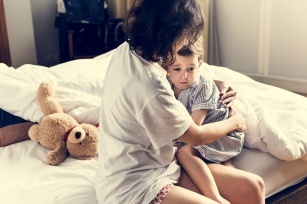Contents

Night terrors in children are a very common problem, which is estimated to affect people aged 3 to 12 years, with statistics showing that the largest number of such cases is recorded at the age of 3,5 years. They manifest themselves in a very simple way – restless sleep expressed by constant twitching on the bed, moaning, crying, excessive, nervous mobility. Very often parents, seeing that the child is experiencing difficult emotions, try to wake them up, which is not always successful. After such a night, the toddler wakes up sleepy, overtired, and it is no different with parents trying to remedy this situation. So what are night terrors caused by? What types can they be?
Night terrors in children – where to look for the causes?
Children in whom they occur night terrors, very often during them they cry very much, panic seizes them. The reasons can be found primarily in the complicated nature of the child, but also in very prosaic factors, such as: lack of sleep, taking certain medications, experiencing stressful moments in life. This disorder occurs in about 6% of children under the age of 12, gender does not matter. Fears in children appear especially at night. They are usually accompanied by crying, the child’s feeling of panic and finally the inability to wake up the toddler, which results in morning fatigue, an unpleasant atmosphere at home. Sometimes there are also additional factors that increase this unpleasant phenomenon – the child sweats, the heart starts to work harder. anxiety episode the next day it is usually repressed from memory, which makes it different night terrors from nightmares – these in turn are remembered and then reported.
Night terrors in a child – the phases of a child’s sleep
Night terrors interfere with the normal functioning of the child, causing the occurrence of sleep disorders. What actually happens during this anxiety episode? It usually occurs about 1,5 hours after falling asleep. The child suddenly starts to make violent movements, sits on the bed, shouts. His parents cannot communicate with him – although he is conscious, he seems incapable of responding to any stimuli. Theoretically, he is awake, but he does not notice the presence of his parents, he cannot speak. Usually he is unable to sit still, he is constantly in motion and emotional agitation, which makes it difficult for his parents to resolve the situation. Classic anxiety episode it lasts up to 2 minutes, but before the child calms down and goes back to bed – it takes from several minutes to an hour.
Nightmares in children
Nightmares in children they are usually not a cause for concern, but only a difficulty affecting the quality of everyday life of both the child and his parents. The attention of the child’s carers should be drawn to the increased frequency of occurrence night nightmares – in younger children, up to 3,5 years of age, it is worrying to repeat anxiety episodes more than once a week, in older children, a problem should be diagnosed if it occurs more than once a month. The doctor must know the history of the ailments, examine the child and decide on possible preventive measures. Sometimes such symptoms may indicate serious problems, then the doctor decides to order a computed tomography scan, aimed at e.g. exclusion of epilepsy.
Anxiety in children – what should a parent do?
Parents struggling with such a problem of their child should first of all take care of his sense of security – both physical and emotional. In the room where the child sleeps, there must be no objects that threaten the physical safety of the child during sleep anxiety attack. It is also important to ensure that your child gets a regular amount of sleep – they wake up and get up at the same time. Usually, these difficulties pass with age and are not a reason to consult a specialist.









